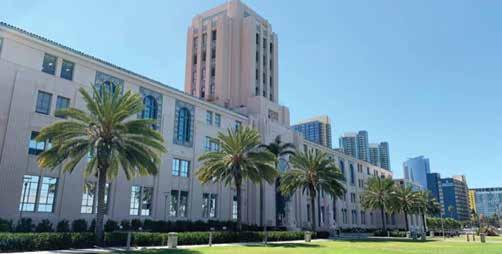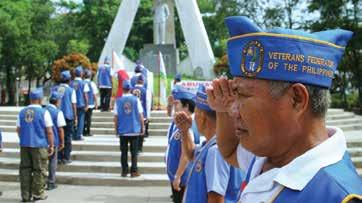
5 minute read
Toward a more perfect...
PAGE 1 previously excluded from the halls of power almost completely. participate in budget presentations, hearings, deliberations and adoption at upcoming Board of Supervisors meetings.
Budget presentations take place before the Board on May 11. Public hearings are 9 a.m. on June 12 and 5:30 p.m. on June 15. Budget deliberations and adoption are scheduled for June 27.
Advertisement
Investment priorities in the recommended budget include:
Mental health and substance use disorder $66.7 million increase for a total investment of $737.9 million for contracted services including:
• $37.5 million mental health services for adults.
• $10.9 million for crisis diversion services including expanding Mobile Crisis Response Teams, the Crisis Line, public messaging awareness and crisis community-based services.
• $9.5 million substance use disorder
Building on the Fair Maps Act
At a recent press conference hosted by California Common Cause to discuss two measures currently grinding their way through the state Assembly, AB 764 and AB 1248, speakers shared these and other stories to demonstrate the ongoing need to improve and expand the state’s redistricting process.
“We have got to institutionalize protection so that communities don’t have to fight tooth and nail for their rights,” said Dora Rose, deputy director of the California League of Women Voters, one of the sponsors of the two bills.
“We’ve got to build on the success of the Fair Maps Act.”
“Otherwise, we end up with older white people in charge, who just don’t reflect the Latino people, the API people, the Indigenous people, the Black people, the youth, that together make up the majority of our vote,” Rose said.
California passed the Fair Maps Act (AB 849) in 2019 to strengthen earlier legislation in 2008 and 2010 that led to the IRC’s formation and its initial implementation following the 2010 Census. Closing loopholes in the redistricting process
But the FMA had “a huge loophole,” said Jonathan Mehta Stein, of California Common Cause: It failed to specifically address incumbent protection.
AB 764 closes that, banning drawing districts “for the purpose of favoring or discriminating against an incumbent or political candidate.”
It goes on to spell out specific, uniform and prioritized criteria for how district boundaries are to be determined up and down the state and compels local IRCs to issue reports explaining their ultimate decisions.
AB 764 also mandates set numbers of public hearings and workshops for the process, including provisions on timing, accessibility and noticing. It requires that draft maps be unveiled in time for the public to effectively respond and clarifies the legal process for resolving disputes.
AB 1248 orders that any county, city, school district or community college district serving more than 300,000 people must establish an IRC by the time the next batch of population data from the U.S. Census comes in to set the redistricting process in motion, as it does every 10 years at the beginning of the decade.
If the jurisdiction fails to form a committee, the legislation provides guidelines on how to meet the requirement.
This will bring into the fold
17 California counties that do not currently have IRCs (five already do), plus the cities of Anaheim, Bakersfield, Fresno, Irvine, Long Beach, Los Angeles, Oakland, Riverside, Sacramento, San Diego, San Francisco, San Jose, Santa Ana and Stockton, 20 school districts and many community college districts, too. It specifies standards for appointments to the commissions such as residency qualifications and an ability to be impartial, as well as prohibitions, for instance, against doing redistricting work outside of public view.
Along with Rose and Stein at the briefing were representatives of the Asian Law Caucus, Asian Americans Advancing Justice Southern California and the ACLU, all of which were primary sponsors of one or both of the measures.
Maps designed to protect incumbents
Also on hand was Nicolas Heidorn, whose report, “The Promise of Fair Maps,” published earlier this year, studied the successes and shortcomings of the Fair Maps Act in the subsequent redistricting process. Heidorn’s findings, Stein said, were foundational in the drafting of the two measures currently under review. He wrote that the FMA improved the transparency of and public participation in the 2020 redistricting cycle, with some jurisdictions surpassing its requirements.
“The FMA was broadly successful in promoting a more transparent and participatory local redistricting process” and producing maps that better reflect the state’s diverse communities, the report found.
But it also noted “ambiguities, loopholes, and deficiencies in the legislation that undermined the law’s important goals and were often exploited to protect incumbents.”
“In many jurisdictions, incumbency protection proved to be the overriding criterion for how maps were drawn.”
“This is a statewide problem that demands statewide solutions,” Stein said.
AB 764 and AB 1248, sponsored by Assemblyman Isaac G. Bryan, D-Culver City, and Senator Ben Allen, D-Santa Monica, both cleared the Assembly’s Local Government committee on April 26 and will now be taken up by the Appropriations committee.
If approved there, they’ll go to the full Assembly for a vote, and then have to repeat that process through the State Senate before arriving on Gov. Newsom’s desk. (Mark Hedin/Ethnic Media Services) n
US lawmakers renew...
PAGE 1 honor and bravery during World War II. But for too long, they’ve been denied many of the rights and benefits they deserve, including the ability to reunify with their families in the U.S.,” Senator Hirono said in a press release.
More than 260,000 Filipino soldiers fought under the American flag from 1941 to 1946 when the Philippines was a U.S. colony. In 1990 former President George H. W. Bush granted U.S. citizenship to about 26,000 of them.

However, the law did not grant citizenship or residency to the veterans’ children. To this day, Filipino applicants must wait nearly 20 years before their applications are considered.
In 2016, U.S. Citizenship and Immigration Services implemented the Filipino WWII Veterans Parole program to reunite veterans with their families. However, the extensive delays are leaving applicants without certainty as dozens of the surviving veterans are now over 100 years old.
The new legislation would amend the Immigration and Nationality Act, providing a permanent solution for WWII veterans who were naturalized under the 1990 law or other specified laws.
“To express our gratitude to the brave Filipino service members who fought for our nation in WWII, we should do what is right and fair for our veterans and their family members,” Senator Lisa Murkowski said in a press release. “This bill will reunite mothers and fathers with their children, and honor the service of Filipino veterans who served under the American flag.”
“I’m proud to reintroduce the Filipino Veterans Family Reunification Act to reunite these veterans with their loved ones,” Hirono added. “I will continue working to support Filipino veterans, their families, and all veterans in Hawaii and across our country.”
Hirono has been leading the bipartisan Filipino Veterans Family Reunification Act since 2013. She also led the introduction of the Filipino American History Month (FAHM) Resolution recognizing October as FAHM and celebrating the heritage and contributions of Filipino Americans. Due to her years of advocacy, Congress finally awarded the Congressional Gold Medal, the highest civilian award from the U.S. government, to Filipino WWII veterans in October 2017, after the Filipino community’s decades of fighting for the veterans’ recognition. (Inquirer.net) n






